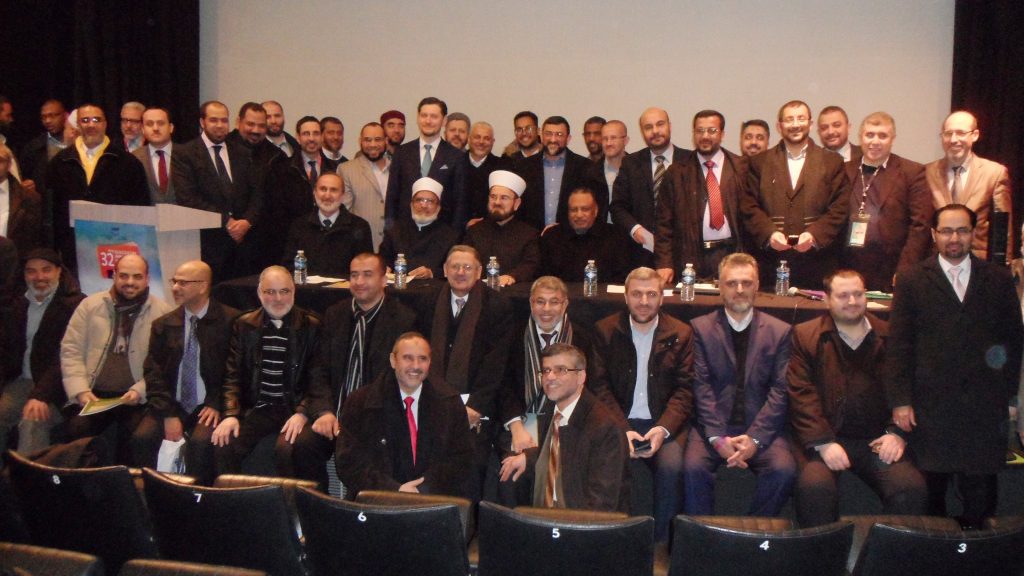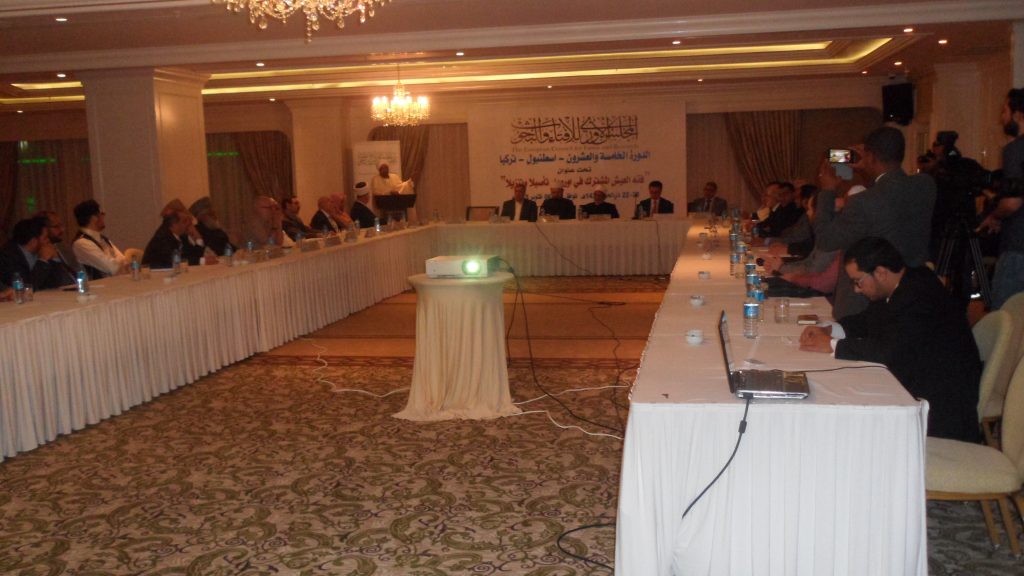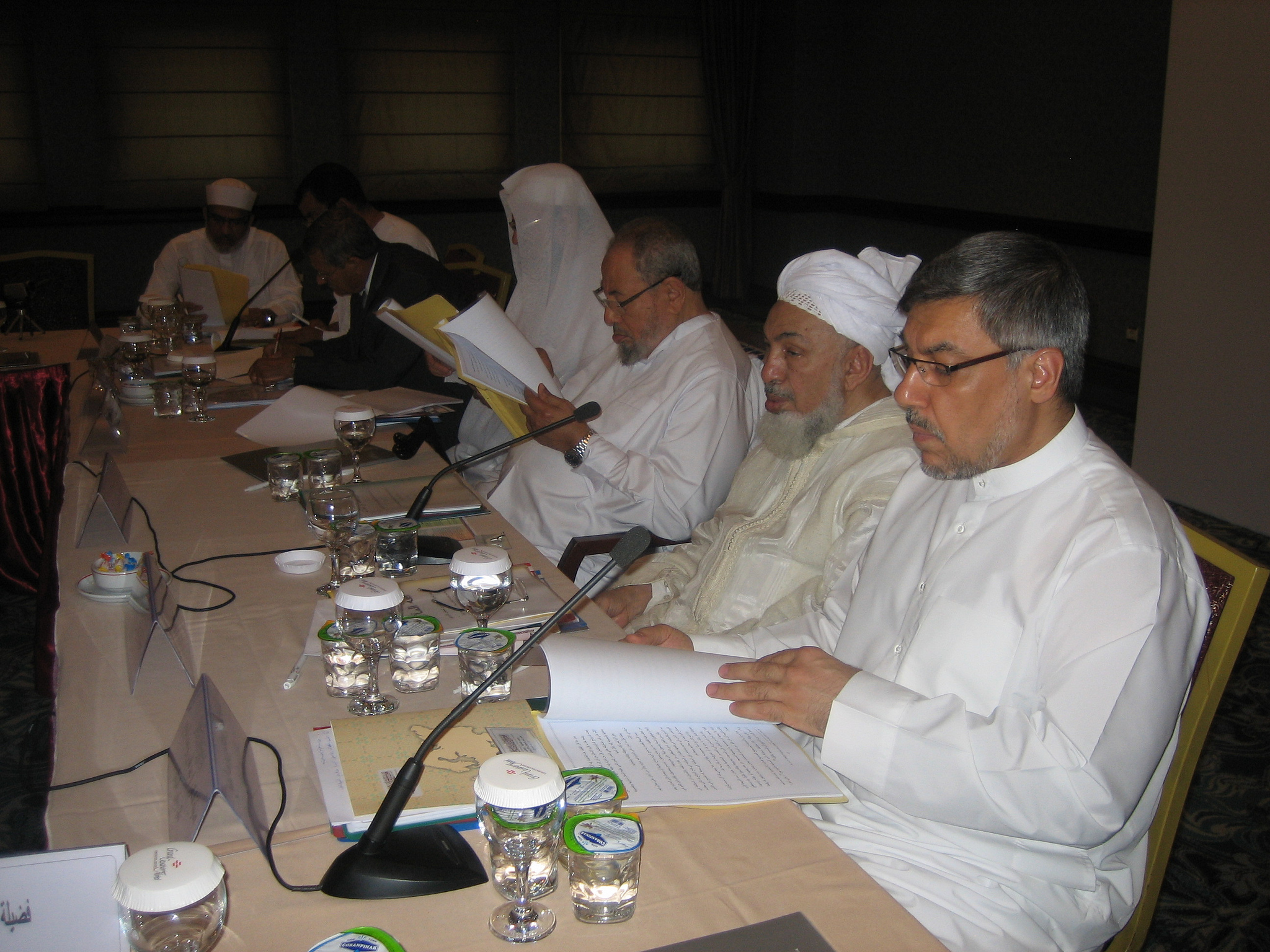The Nineteenth Ordinary Session of The European Council for Fatwa and Research

European Council for Fatwa and Research
Final Statement
The Nineteenth Ordinary Session of
The European Council for Fatwa and Research Held in Istanbul, Turkey
During the period
08th – 12th Rajab 1430 AH
30th of June – 04th of July, 2009
In the Name of Allah, Most Gracious, Most Merciful
The final Statement of the Nineteenth Ordinary Session of the European Council for Fatwa and Research was held in Istanbul, Turkey during the period 08th – 12th Rajab, 1430 AH corresponding to 30th – 04th of July, 2009
Praise be to Allah, the Worlds’ Sustainer, and peace be upon our leader Muhammad and on all his family and his Companions and those who follow his guidance until the Day of Judgment.
By Allah’s Grace and His Assistance the Nineteenth Ordinary Session of the European Council for Fatwa and Research was held in Istanbul, Turkey during the period 08th – 12th Rajab, 1430 AH corresponding to 30th – 04th of July, 2009, chaired by His Eminence Sheikh Dr. Yusuf Al-Qaradawi, the Chairman, and attended by most of the Members of the ECFR and a number of guests and observers.
The Nineteenth Session, inaugurated in a big celebration attended by a great crowed, In addition to the members of the ECFR, commenced with a number of talks. The welcome speech was delivered by Mr. Najm-ud-Deen ‘Ughlu, Secretary General for the Union of NGOs of the Islamic World (IDSB). Successively Sheikh Hussein Halawa, Secretary General of the ECFR, delivered a speech in which he briefly illustrated the history of the ECFR and its role regarding reaching Islamic moderate solutions to obliterate problems confronting Muslims living in Europe. This speech was followed by two speeches; the first was delivered by Mr. Ali Nobal, representative of the Ministry of Endowment and Religious Affairs in Turkey and the latter by Dr. Ahmad Bakindus, Director of Rotterdam Islamic University in Holland. This inauguration was concluded by a speech delivered His Eminence Sheikh Yusuf Al-Karadawi in which he welcomed the members of the ECFR and the attendees. He also highlighted the moderation of Islam and the vital role performed by the ECFR regarding the affairs of Muslims living in Europe.
On the next day the ECFR resumed the programme of its 19th session commencing with a Fiqh seminar on “Muslim Financial Transactions in the West”deliberating on the following foci:
First: Fundamental Papers:
A paper submitted by Sheikh Rashid Ghanushi entitled “The economic Dimension of Shura (consultation)” was discussed.
Second: The Economic Crises:
The following papers were submitted and deliberated:
- “The Economic Crisis, Long Term Solutions” by His Eminence, Sheikh Yusuf Al-Qaradawil
- “The International Economic Crisis, Reasons and the Islamic Solution” by Dr. Suhaib Hassan.
- “The International Economic Crisis, Reasons and Results” by Dr. Hamzah Al-Fa’r.
- “The International Economic Crisis, Partnership – an Islamic Alternative to Bank Deposits and the Commercial Insurance” by Dr. Salah Sultan.
- “The Economic Crisis, Reasons and repercussions and the Islamic Alternative” by Dr. Ali Quradaghi
Third: Islamic Banks in Europe:
The following two papers were submitted and deliberated:
- “Taking Loans that incurs interest from banks based in non-Islamic countries” by Dr. Mashhur Fauwaz Mahajnah
- “The Islamic Banking Experience; Fields, Challenges and Horizons” by Mr. Muhammad An-Nuri
Fourth: selling by instalments
The following papers were submitted and deliberated:
- “Factoring, Forfeiting and Selling by instalments increasing the price” by Dr. Munther Qahf
- “The Islamic Rule of Selling by instalments increasing the price and Some Problems in Europe” by Dr. Hamzah Abu Faris
- “Types of Selling by Instalments Funded by Financial Companies and Islamic Rules (the UK as an Example)” By Sheikh Salem Al-Shaikhy
Fifth: Islamic Insurance:
The following papers were submitted and deliberated:
- “General Rules for the Collaborative Insurance” by Dr. Ali Al-Quradaghi
- “The Islamic (Collaborative) Cooperative Insurance” by Dr. Abdus-sa-TTar Abu Gidah
- “Medical Insurance” by Dr. Haitham Al-Khaiat
Sixth: Economic Issues:
The following papers were submitted and deliberated:
- “Islamic Rules for Transactions” by His eminence, Sheikh Yusuf Al-Qaradawi.
- “The Organized Tawaruq[1] as Conducted by Islamic Banks and Islamic Branches in Europe” by Dr. Muhammad Al-Banna.
- “Inflation and the Islamic Stand” by Dr. Ali Al-Quradaghi
Seventh: The Fasting Periods in the summer and verifying the Commencement of the Lunar Months:
In his presentation, Dr. Muhammad Hawari elaborated on issues pertinent to the long periods of fasting in the summers of the coming years. In addition, he shed light on the methodology applied to prove the commencement of the lunar months. He recommended the ECFR to reconsider a previous issued resolution by the ECFR in the interest of Muslims living in Europe.
Upon submitting and deliberating on the above mentioned papers in addition to a number of issues pertaining to Muslims living in the West, The ECFR issued the following:
First resolutions
Resolution 1/19
Cooperative (collaborative) insurance and its rules
Upon deliberating on the submitted papers on “Cooperative Insurance”, the ECFR resolved as follows:
The cooperative insurance is founded on a number of principles and rules, differentiating it from conventional insurance, the most important of which are:
First: Opening two distinctive accounts; the first belongs to the company, established to manage the cooperative insurance, and is devoted to the company and its requirements. The latter is devoted to payments made by policy holders, their profits, compensations and administrative costs.
Second: This insurance system should be based on commitment to donations and cooperation, common behavior of Prophet Muhammad’s Companions, may Allah be pleased with them.
Third: The company should be an agent, paid or volunteer, in charge of the insurance account. On behalf of the policy holders it should conduct insurance and investments on the basis of Mudarabah or investment on behalf of others.
Fourth: The surplus should be kept in the insurance account. The company should not take any amount thereof. It should be stated in the statutory foundation that the accumulated surplus should be spent on charity when the company is terminated. The insurance surplus refers to the remaining amount in the insurance account after covering compensations and the administrative cost and giving due portions to the policy holders. This surplus could be spent by the administration as follows:
- Distributing it on the policy holders who have not made any claims throughout all the financial year.
- Distributing it on those who have not made claims or those who have made claims but have not consumed all their accounts. They can receive relative portions according to the remaining amounts in their respective accounts.
- Distributing it on all the policy holders regardless of whether they have made claims or not.
Fifth: Abiding by the principles and the rules of Islamic Shari’ah in all activities of the company, insurance account and insurance activities. In order to fulfill this, a committee for Fatwa and a regulatory body should be formed.
Resolution 2/19
Tawaruq[2]
The ECFR deliberated on the issue of Tawaruq performed by some Islamic banks and noticed that Islamic academies have issued important resolutions in this regard. For instance, in its 19th session held in Sharjah, UAE in the period 1st -5th of Jumada Al-‘Ula corresponding to 26th -30th April 2009, the International Islamic Fiqh Academy, formed by the Organization of Islamic Conference, perceived prearrangement, implicit and explicit, even if it is part of the culture, a determining factor in the organized Tawaruq and that it turns any transaction into plain Riba (usury). The same resolution was issued by the Islamic Fiqh Academy, which is attached to the Islamic World League. The Islamic Fiqh Academy added that purchasing the commodity should be purely targeted to avoid Riba.
The ECFR resolved to adopt these resolutions issued by Islamic academies and due to their paramount importance in clarifying the true Islamic financial procedures especially in this particular time when financial institutions and authorities in Europe endeavour to understand and apply them, the ECFR invite regulatory bodies of the Islamic financial organizations in Europe and abroad to apply these resolutions.
Resolution 3/19
Verifying the commencement of the Lunar months
The ECFR considered its resolution number 4 issued in the 17th session held in Sarajevo, Bosnia in the period 28th of Rabi’ Al-Akhr – 02nd Jumada Al-‘Ula 1428 corresponding to 15th – 19th May 2007 pertinent to verifying the commencement of the lunar months especially Ramadan and Shauwal. Upon studying and detailed deliberation, the ECFR amended its previously issued resolution as follows:
- Astronomical calculations have become one of the contemporary sciences that have reached a very high level of accuracy with regard to the courses of planets. This is especially so in relation to calculating the positions of the earth and moon in relation to each other so that there is no room for doubt at any time.
- The moment of the waning of the moon is a universal event occurring all over the globe in the same moment. Years in advance, astronomical calculations can specify with significant accuracy when it will happen. The occurrence of such an event astronomically marks the culmination of the last month and the commencement of a new month. Such waning of the moon could occur at any moment of the day or night.
- Islamically to prove the commencement of new month the following conditions should be fulfilled:
v The waning of the moon should have already occurred prior to sun-set.
v Sighting the crescent should be possible, either by the naked eye or by using equipments, in any part of the earth. Since the obligation of fasting when seeing the crescent has been expressed in a general formula, the differences of locations should not be considered.
v In order to accept the possibility of sighting the crescent the following astronomical conditions should be observed:
- The crescent should set after the sun sets, while being in a visible position.
- The angle of the position of crescent should not be less than 5 degrees in the horizon at the time of the sun setting.
- The angle distance between the sun and the crescent should not be less
than 8 degrees.
- Muslims living in European countries should apply this rule to determine the commencement and the culmination of the lunar months, especially the month of Ramadan and the month of Shauwal. Specifying these months in advance helps Muslims to fulfill their rites and celebrate and organize the festivals and occasions pertaining thereto.
- The ECFR recommends its members, Imams and Islamic Scholars, both living in Muslim and non-Muslim societies, to endeavour to instill the culture of respecting definite outcomes of astronomical calculations when stating the impossibility of sighting the moon due to the waning of the moon. In this case people should not be urged to try to sight the moon and claims of sighting the moon should be rejected.
- The ECFR, God willing, will issue a calendar that states the commencement and the culmination of each month on the basis of this resolution.
Resolution 4/19
Performing Hajj and ‘Umra in the current situation where swine flu (N1H1) is widely spread
A question was raised to the ECFR regarding travelling to perform Hajj or ‘Umra this year in light of the wide spread swine flu (N1H1) in many countries and raising the warning of this epidemic to the sixth degree. The ECFR contacted the International Health Board which stated that the above mentioned degrees refer to the geographical spread of N1H1 and have nothing to do with the degree of its danger. The sixth degree has been declared since a number of cases have been recorded on all continents. The Director of this board, who is the only authorized person all over the world to apply and interpret the international health regulations, stated that the swine flu is an average epidemic and is not worse than the conventional seasonal flu.
It has never been the case that Hajj or ‘Umra were not permitted or limited because of the conventional seasonal flue. Nevertheless, in its statement issued by the Saudi cabinet in their final meeting held on 22nd of Jumada Al-Akhira 1430 corresponding to 25th July 2009, the Saudi government declared a complete plan that involves making all preparations to prevent this epidemic. The Saudi health department issued the health conditions for performing Hajj this year and preserved the right of taking other procedures.
On the basis of the above mentioned, the ECFR does not see the point of any Fatwa preventing Muslims from performing Hajj or ‘Umra this year. However, it is necessary to take all procedures that prevent this epidemic and others as well. In brief these procedures involve avoiding hugging and kissing, minimizing shaking hands if possible, washing hands after touching patients or being polluted, covering the mouth and the nose with a tissue when sneezing or having a cold and preferably wearing surgical masks when joining a gathering. It should be noted that these surgical masks should be regularly replaced and disposed of in a hygienic way. Moreover, one should abide by the regulations, e.g. vaccination and taking the needed medicine, issued by the Saudi heath authorities and the health authorities in the home countries of the pilgrims and those performing ‘Umra. These regulations can be made easier or stricter in conformity to the health situation.
The ECFR recommends the elderly people and those who have chronic disease and those who take medicine that weakens immunity to postpone performing Hajj and ‘Umra. The ECFR makes the same recommendation to those who have already performed hajj and ‘Umra in order to decrease the crowdedness.
Postponed issues
Resolution 5/19
Selling by installments
Upon detailed deliberation on the submitted papers and studies pertaining to selling by installments conducted in Europe, the ECFR resolved to postpone issuing a resolution on this matter to the next session, God willing, to conduct more researches.
Resolution 6/19
Cash inflation
Upon deliberating on the issue, the ECFR resolved to postpone issuing a resolution on this matter to the next session, God willing, to conduct more researches.
Resolution 7/19
Factoring and forfeiting
The ECFR deliberated on the various types of factoring and forfeiting as well as leasing. It was clarified that these transactions have different types and they should be covered and explained in a paper so that the Islamic rule for each type thereof can be offered on the basis of clear understanding. Hence, the ECFR resolved to postpone issuing a resolution on this matter until the next session and request a number of the specialists to write papers on this issue to understand the types thereof practiced in Europe.
Resolution 8/19
The long periods of fasting in Europe in summer
Upon deliberating on a presentation on this issue, the ECFR resolved to request a number of specialists in astronomy and Fiqh to write papers on this issue so that it can be discussed in the next session, God willing.
Recommendations
In light of the international economic crisis, the ECFR issued the following recommendations:
The ECFR perceives Islamic economic and fund principles as solutions to the international economic crisis. It also stresses that economy should be based on ethics. Principles, values and ethics should be activated in economic and financial transactions by forming regulatory bodies in money markets and financial transactions. These committees should supervise the ethical practices in financial transactions.
The ECFR stresses the necessity of applying an entirely open approach and that the media should provide accurate information and analyze it so that investors can evaluate financial institutions and their products.
The ECFR also confirms its invitation to juridical and regulatory bodies in charge of money markets and banks in European countries to endeavour to amend the regulations and laws of the financial markets illegalizing all non-true transactions, zero-sum transactions, debt trading, indices, insurance derivatives, short term sales and other transactions and contracts, which are not based on ethics and deviate the financial market, when they are supposed to help the market of productivity and the circulation of commodities and services.
The ECFR demands that financial and bank authorities in Europe should study seriously the possibility of supporting the Islamic funding and Islamic banks. The ECFR also call for the amendment of the current laws in order to remove obstacles in the way of establishing Islamic banks in Europe and encouraging conventional banks to facilitate Shari’a compliant funding contracts.
The ECFR, while appreciating efforts exerted by some European countries to study the possibility of applying Islamic banking system, would like to offer help in providing solutions through its members and expertise and through its connections with specialized scholars who are able to positively contribute to this field.
2- The ECFR recommends that Muslim citizens in Europe should establish Shar’ia financial institutions providing services in the fields of insurance, banking, renting, investing etc. The ECFR would like to seize this opportunity to extend its thanks and express its appreciation to the governments that facilitated establishing Islamic financial institutions by amending regulations and laws and in particular the British government that allowed the establishment of an Islamic cooperative insurance company.
3-On the occasion of issuing a resolution by the European parliament deeming the 11th of July a commemoration day for the victims of the Srebrenica massacres perpetrated by Serbian forces on the day in 1995, the ECFR pays tribute to this resolution and invites Imams of all mosques all over Europe to talk about these massacres in the nearest Friday’s speech to this date reminding the world of these horrible crimes and commemorating the martyrs, men, women and children, pray to Allah to forgive them and reward them abundantly and offer condolences to thousands of women and elderly people who were forced to leave their home.
The laws enacted nowadays by the French government to ban the Niqab represent a violation to human’s personal and religious freedoms guaranteed by French laws, human rights and international laws. The ECFR confirms that both Hijab and Niqab are neither religious nor political symbols but rather an Islamic obligation as the case of wearing Hijab. Nevertheless, the concerned authorities have the right to request the removal of the Niqab if there is a need therefor e.g. identifying the person or for security reasons.
5-While condemning the wild atrocities perpetrated by the Zionist entity on Gazans, the ECFR appreciates efforts exerted by sincere free Muslim and non-Muslim European citizens who expressed their solidarity with the oppressed Gazans and particularly those who tried to break the embargo by sending the necessary aids in terms of food, clothes and medicine to Gaza. The ECFR recommends all Muslims and supporters of the oppressed and human rights all over the world to perpetually express their solidarity with the Palestinians to have honourable lives and liberate the Palestinian occupied territory. The ECFR recommends keeping the good work going until this embargo that slowly kills children, women and patients in Gaza is lifted. The ECFR clarifies that closing crossings and especially at Rafah is forbidden and recommends those in charge to operate them.
The ECFR also recommends leaders and the in charge in Europe to review their attitudes regarding Judacizing Jerusalem, violations of Al-Aqsa mosque and building settlements challenging the feelings of millions of Muslims, all international values and international foundations of coexistence and security.
While being considerably worried, the ECFR warns against the danger resulting from the approach of the international politics terminating the Palestinian issue by striking out the right of return of the Palestinians who were forced to leave their home by oppression, transgression and confiscating their right of resistance to liberate their land. Such rights are guaranteed by international laws and human values.
The project being prepared by international politics i.e. adding Jerusalem to the Zionist entity and subjecting the holy shrine to international supervision is even more dangerous.
The ECFR concluded the fifteenth session confirming the usual recommendations to Muslims issues as follows:
- Observe all rights and reflect a good image and a benevolent example through their words and deeds.
- Be creative and inventive and encourage that on all levels.
- Do their best to bring up the new Muslim generation – boys and girls- in a contemporary Muslim way via opening schools and educational and recreational centers to protect them against deviation.
- Work hard to establish firms and financial institutions that do not get involved in illegal transactions.
- Work hard to form legal (Shari’a) committees to regulate their family affairs according to shari’a and in conformity with the laws of the country where they live.
- Work hard to attain the recognition of the state where they live of Islam as a religion and of Muslims as a religious minority like other minorities in respect to enjoying their complete rights and organizing their personal affairs, such as marriage and divorce according to the tenets of their religion.
- Commit themselves to what is stated in the Holy Qur’an and Sunnah and what Muslim Fuqaha’ (jurists) have unanimously agreed upon regarding the obligation of keeping the requirements of the pledge of security and the terms of citizenship and residence in the countries where they live.
- Shun all types of violence and adopt a merciful and wise approach when dealing with all people by virtue of their Islamic obligations and condemn any other behavior. The Council also recommends that Muslims in general and those dwelling in the West in particular adhere to Allah’s religion and brotherhood, tolerance, moderation, cooperation in matters of benevolence and righteousness, and adopt quiet dialogue and sound methods to solve controversial problems away from the programmes of strictness and paths of extremism that would distort the image of Islam and badly harm Muslims in general and Muslim minorities in particular. The enemies of Islam and those ignorant of it would defame it and warn others of it and its followers and instigate other nations against it. Allah Almighty says: “Invite (all) to the Way of your Lord with wisdom and beautiful preaching and argue with them in ways that are best and most gracious.” (An-Nahl 125)
In its 19th session, the ECFR deliberated on a number of Fatwas pertinent to various financial transactions and issued suitable answers.
Upon the completion of academic deliberations, the ECFR declared that the next session will be held around mid 2010.
The Council concluded the proceedings of the19th Session by addressing sincere thanks, prayers and appreciation to the al-Maktoum Charity Committee for their continuous support and sponsorship of the Council. The Council also extends sincere thanks to the Turkish Government for facilitating the holding of this session in Istanbul, their cooperation with the ECFR general secretariat and the granting entry of visa to the members.
The ECFR would like to thank its general s secretariat and all the brothers and sisters who contributed to the success of this session.
Our last prayer is praise be to Allah and may Allah’s peace, blessing and mercy be upon Prophet Muhammad, his family and his Companions.
[1] A transaction that involves purchasing a commodity at an immediate price and then selling it to a customer by instalments at a higher price. This customer sells it in the market at a lower price to get cash
[2] A transaction that involves purchasing a commodity at an immediate price and then selling it to a customer by instalments at a higher price. This customer sells it in the market at a lower price to get cash





